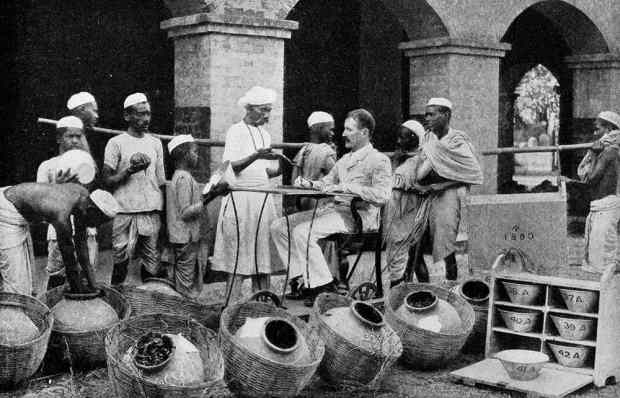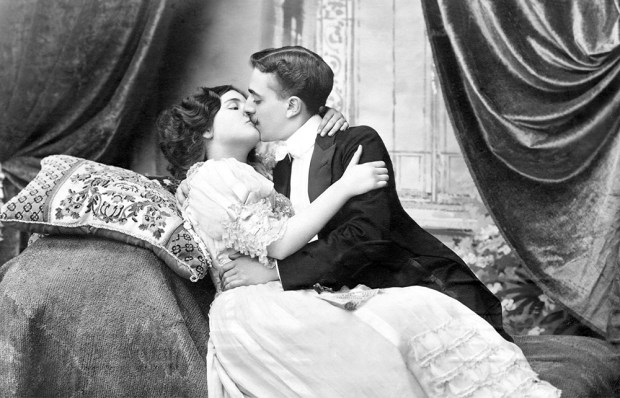Saturday morning. Quarter to 12. Sit-down fish and chips at the Silver Grill: me, Oscar and Oscar’s cousin Atticus. Atticus lives with Oscar because his life is arranged by social workers and the courts. He is a year younger than Oscar, which is to say seven, and they share a bedroom with another, older boy. This is Atticus’s first weekend with Oscar’s grandfather (me) acting as host and entertainments officer, and it could be termed an experiment. The relationship between Atticus’s little bottom and the seat of his chair suggests opposing magnetic fields.
‘And what to drink?’ said the waiter. ‘Tango or Fruit Shoot?’ Atticus chose Tango. Oscar peached that fizzy sugary drinks send Atticus off his rocker. Atticus agreed. ‘Sometimes, if I have too much sugar, I behave unacceptably,’ he confessed. ‘So ifI ask for sweets or a fizzy drink, and I’m not allowed any, then I accept that.’ The waiter and I frankly goggled at this seven-year-old state-run child’s dispassionate analysis, and the faintly Orwellian language in which it was couched. Oscar, however, was merely amused by how Atticus was continually forced to make the best of a very weak hand. ‘Two Fruit Shoots and a mug of tea, then,’ said the waiter briskly, in deference to a sensible choice.
‘How’s your mum these days?’ I said to Atticus, while we waited for our meals. ‘Well, I try to keep it all inside my head,’ he said, trying to be as frank as possible about a difficult subject. ‘But when people ask me questions, it grows too big for my head and then it tries to come out, and I get upset and I cry.’ Right on cue, his mouth twisted grotesquely against a powerful emotion that welled up and almost upset the apple cart.
Our plates of crisply battered cod, chips and mushy peas and our drinks arrived and we set to. Atticus ate with his fingers, and, refusing the formal limitations imposed by his seat, he ate standing up. ‘Do you know how to use a knife and fork?’ I said to him, purely out of interest. He said he did know and he picked them up and brandished them at me to prove it. The fork was in his right hand, the knife in his left. ‘Bravo,’ I said. Having proved his point, he threw them aside and resumed eating with his fingers while jigging about distractedly, as if ina trance, and singing.
An elderly couple came in and chosea table at the other end of the room. Coincident with their arrival I became irritated with this exhibitionism. ‘You’re eating like a chimpanzee,’ I said. He took no notice of this; he remained locked in his trance. Not wanting to appear too embarrassingly lower middle class, I went on to explain to Atticus that while in private he was free to behave as he liked, in public he was bound by certain rules, informally agreed over time, governing what is called, or used to be called, ‘civil society’. These rules might vary slightly according to which part of the country in which he should find himself, or among which social class. But under these unwritten rules, by and large, he was permitted to draw attention to himself as obviously as he was now doing only on a theatrical stage.
Emerging from his trance, Atticus’s reply to this was surprisingly cogent. ‘Did you know,’ he said, ‘that human beings and chimpanzees share 97 per cent of the same genes?’ Yes, I did know that, I said, but to put it in perspective, I said, we also share 93 per cent of our genes with the common winkle. And what about God? I said. Did he believe in God?
Atticus did believe in God, he said. He’d been God in a video game where you are God and you kill anyone that doesn’t believe in you with lightning bolts and you carefully build up communities and churches for those who do. Believers are blues and non-believers are reds. After level five you can destroy hundreds of unbelievers ata time with a tsunami. He plays the God game when he stays with his uncle. If he found out what his uncle’s name is, and where he lived, I could go to his uncle’s house and play it for myself if I liked. It was a tempting offer and I thanked him. And did he have any other known relatives? He had a grandfather, he said, after thinking about it. He didn’t know what his name was, either, but he wore a flat cap like mine, which he’d knitted himself in two colours: red and green.
Although he hadn’t used them, I showed him how to put his knife and fork together on a plate to show that he had finished, and as I did so I felt foolish and ashamed at putting the poor lad under such a trivial obligation.
Got something to add? Join the discussion and comment below.
Get 10 issues for just $10
Subscribe to The Spectator Australia today for the next 10 magazine issues, plus full online access, for just $10.
You might disagree with half of it, but you’ll enjoy reading all of it. Try your first month for free, then just $2 a week for the remainder of your first year.















Comments
Don't miss out
Join the conversation with other Spectator Australia readers. Subscribe to leave a comment.
SUBSCRIBEAlready a subscriber? Log in